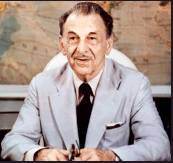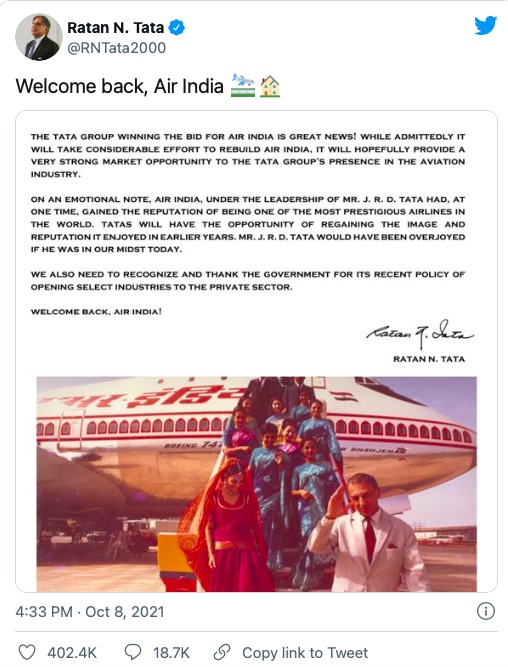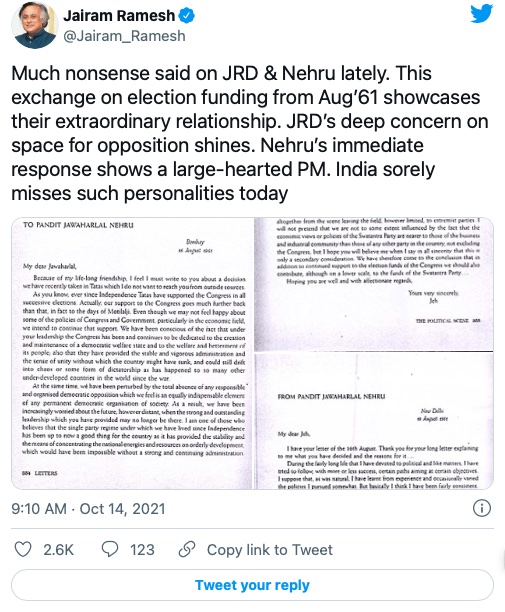JRD Tata
This is a collection of articles archived for the excellence of their content. |
A brief biography
Harish Bhat, How JRD’s relief & revival plan gave India a push, August 10, 2018: The Times of India

From: Harish Bhat, How JRD’s relief & revival plan gave India a push, August 10, 2018: The Times of India
Tata Legend Helped Craft Industrial Policy In 1944 & Set Up PM Fund During Partition
In 1938, JRD was appointed as chairman of the Tata Group, which he led for over 50 years, with an unrelenting quest for excellence. Many great Tata enterprises were born during his tenure, including Tata Motors, Tata Consultancy Services and Titan. The Sunday Times of London said this of him in 1951: “Highly strung, but tenacious of purpose, he works quickly and intensively. His passion for accuracy and interest in detail are often disturbing to colleagues and to his own health. He does not disguise his contempt for superficial knowledge and glib opinions.”
Yet, if there is one aspect of JRD that outweighs his drive for perfection and his significant business achievements, it is his abiding love for the country. Three stories bring this to life. In 1944, JRD did something quite unique for a corporate leader. Along with other leading Indian industrialists, including G D Birla and Kasturbhai Lalbhai, he helped craft the Bombay Plan for India’s industrial growth. This was several years before the government’s own first five-year plan was conceived.
The Bombay Plan created a storm, because it was ahead of its time, calling for massive investments in roads, railways and power.
On account of its radical proposals, the plan caused great discomfiture to nearly everyone — British rulers, leftists, Gandhians and many businessmen. The Economist magazine called the plan “a commendable piece of enterprise”. Many years later, President R Venkataraman recalled the Bombay Plan as one of JRD’s contributions to India. Most importantly, this initiative reflected JRD’s view that industry should play a key role in national development, a theme which has always been central to the Tata Group.
In October 1947, even as the partition of India led to waves of refugees coming into the country, J R D Tata wrote to the Prime Minister Jawaharlal Nehru, suggesting that a national fund for relief and distress should be started in the name of the PM. He said that the Tata Group would be happy to make a substantial grant to such a fund. He also wrote, somewhat provocatively: “If you have no such intention, would you advise me as to what we should do?” However, Nehru agreed entirely with JRD’s suggestion: “After consulting my colleagues here, we have arrived at some decisions.” Thus was established the Prime Minister’s National Relief Fund.
A third story is J R D Tata’s founding of Tata Airlines in 1932. Driven by his own passion for aviation (he was the first to qualify as a pilot in India) and his belief that air transport would be critical for the nation’s future, he built an enterprise that placed the country firmly on the aviation map. Speaking in Mumbai after launching the airline, he said: “I want to express, perhaps unnecessarily, the unbounded confidence we have in the ultimate future of air transport in India.”
The then Director General of Civil Aviation wrote about this venture in The Times of India: “Scarcely anywhere else in the world was there an air service operating without support from the government. It could only be done by throwing on the operator the financial risk. Tata Sons were prepared to take that risk.”
All these three stories illustrate Bharat Ratna J R D Tata’s core belief that “no success or achievement in material terms is worthwhile unless it serves the needs or interests of the country”. Even as we mark the 150th anniversary of the Tata Group this year, we pay tribute to an icon who is truly a jewel of India.
JRD Tata and Nehru/ Indira
Oct 14, 2021: The Times of India

From: Oct 14, 2021: The Times of India

From: Oct 14, 2021: The Times of India

From: Oct 14, 2021: The Times of India

From: Oct 14, 2021: The Times of India
Jairam Ramesh, member of the Rajya Sabha and former environment minister and long-term Congressman, recently lashed out at the storm of abuse aimed at Nehru. “Much nonsense said on JRD & Nehru lately. This exchange on election funding from Aug’61 showcases their extraordinary relationship. JRD’s deep concern on space for opposition shines. Nehru’s immediate response shows a large-hearted PM. India sorely misses such personalities today.”
Earlier, Ramesh had shared a letter written by Indira Gandhi to JRD, after the latter had been removed from his post as Air India chairman.
Interestingly, Indira Gandhi put JRD back on the Air India board (although not as chairman) when she returned to power in 1980, and when Rajiv Gandhi headed the government, he made Ratan Tata chairman of Air India.
JRD Tata himself seems to hold few grudges about his airline being snatched away from him. He never hid the fact that he believed the government had no business to be in business, and that Air India should never have been nationalised, but that did not guide his business or political decisions thereafter. As we see in his letter to Nehru, he says that while the Swatantra Party’s economics was more in the interest of business than the Congress Party’s, “I hope you will believe me when I say in all sincerity that this is only a secondary consideration.”
In a televised interview in 1987, JRD was outspoken about his criticism of Nehru’s view of socialism but goes on to say that India needed socialism, albeit implemented differently.
He also spoke about “when Mr Morarji Desai fired me”, saying, “I’d never been fired before….well, it was not unexpected… the way it was done was not very pleasant to me.”
Through the interview, he speaks of his deep love for “Jawaharlal”, even as he despaired of the way he ran the country. “He liked me, I loved him, admired him. But when on this kind of thing — economics — of which he knew very little in my opinion, and certainly on socialism and how socialism could be established without the loss of economic freedom for the majority of the people…. I’ll tell you what his reaction was… I’d go and see him, sometimes he’d invite me even to have a meal...and then I would try to bring the conversation to economics, nationalisation, bureaucracy. He was not only not interested, he wasn’t willing even to talk. He had invented a little trick...the moment I started something like that, he’d turn around and look out of the window. And I got the message.”